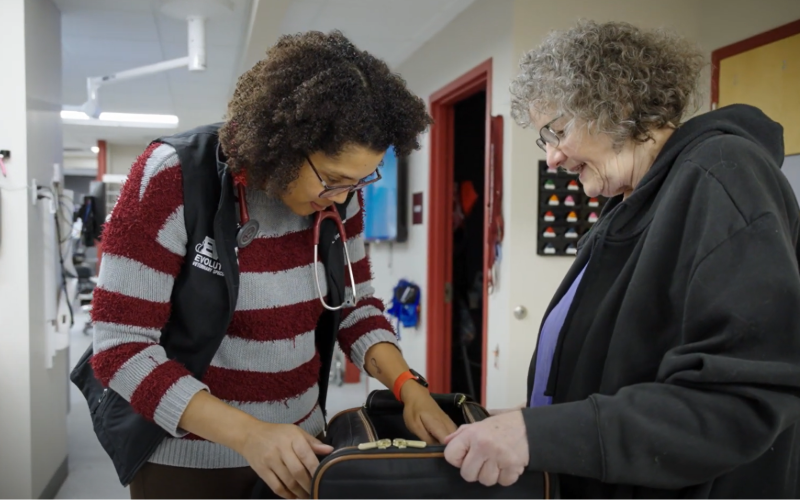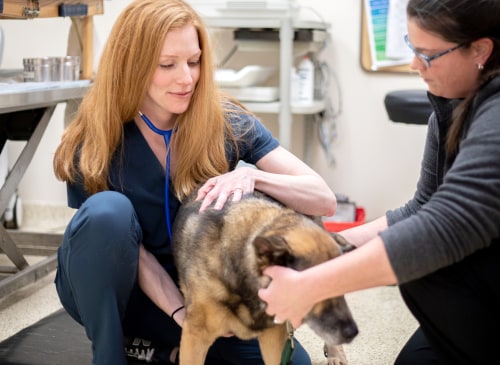Checking Out the Vital Services Offered by a Veterinary Cardiologist: Understanding Ultrasound and CT Check Strategies
Veterinary cardiologists play an important role in the health of animals by diagnosing and treating different heart conditions. They use innovative imaging methods, such as heart ultrasound and CT scans, to offer precise examinations. Each method has its unique advantages and applications. Comprehending these techniques is essential for pet proprietors looking for the very best take care of their companions. What factors should animal proprietors think about when selecting between these analysis tools?

The Role of Veterinary Cardiologists in Pet Health Care
Veterinary cardiologists play a crucial role in the healthcare of family pets, focusing especially on detecting and treating heart-related problems. They have specialized training that permits them to interpret intricate diagnostic tests and identify various cardio issues. These experts utilize advanced strategies, such as echocardiography and electrocardiography, to examine heart feature and structure accurately.Veterinary cardiologists likewise develop customized treatment strategies that may include medications, way of life alterations, and, sometimes, surgical treatments. Their expertise includes informing pet owners concerning heart wellness, emphasizing the significance of normal examinations and early detection of prospective troubles. Partnership with general vets is essential, as it assures extensive look after animals with suspected cardiac issues. By using specialized solutions, veterinary cardiologists significantly enhance the lifestyle for pet dogs and supply comfort for their proprietors, reinforcing the value of heart health and wellness in general pet wellness.
Typical Cardiac Problems in Pets
Typical heart issues in family pets can greatly impact their wellness and lifestyle. Heart whisperings, different kinds of cardiomyopathy, and congenital heart problems are amongst the most widespread conditions that veterinarians run into. Cancer Veterinary Near Me. Comprehending these concerns is important for pet proprietors to ensure prompt diagnosis and suitable therapy
Heart Murmurs in Pets
Heart murmurs can be a source of worry for pet proprietors, they are not constantly a sign of serious wellness problems. A heart whispering is an abnormal noise generated by turbulent blood circulation within the heart. In family pets, these murmurs can be created by numerous aspects, consisting of congenital heart problems, valve issues, or perhaps stress and anxiety throughout evaluations. Lots of pets with heart murmurs lead typical lives without considerable health and wellness influences. To establish the underlying reason, vet cardiologists often utilize analysis strategies such as echocardiograms and Doppler ultrasounds. Early discovery and analysis are crucial, as they might assist manage any type of potential heart issues effectively. Pet proprietors are encouraged to consult their veterinarian for a complete analysis if a heart whispering is spotted.
Cardiomyopathy Types Explained
Cardiomyopathy encompasses a team of diseases impacting the heart muscle mass, causing compromised heart function in pet dogs. The most typical kinds include expanded cardiomyopathy (DCM), hypertrophic cardiomyopathy (HCM), and limiting cardiomyopathy (RCM) DCM mainly affects dogs, causing the heart to weaken and enlarge, which diminishes its capability to pump blood effectively. In comparison, HCM is much more widespread in felines, defined by the enlarging of the heart walls, frequently resulting in blocked blood circulation. RCM, though less usual, happens when the heart muscle ends up being stiff, limiting its capability to loaded with blood. Each kind presents special obstacles in diagnosis and therapy, necessitating specialized veterinary cardiological assessment to assure peak management and look after influenced pet dogs.
Congenital Heart Problems
Congenital heart issues represent a significant group of heart concerns in animals, distinctive from acquired conditions such as cardiomyopathy - CT Scans For Animals. These problems are structural abnormalities existing at birth, influencing the heart's regular feature. Common types consist of license ductus arteriosus, ventricular septal problems, and pulmonic stenosis. Symptoms might differ commonly, ranging from light to serious, and can consist of exercise intolerance, coughing, and problem breathing. Early diagnosis through sophisticated imaging methods like ultrasound is vital for effective monitoring. Vet cardiologists play a vital function in identifying these problems and suggesting proper treatment options, which may include medical monitoring or surgical intervention. Acknowledging hereditary heart issues permits much better end results and boosted lifestyle for impacted animals
Understanding Cardiac Ultrasound: Just How It Functions
A significant number of veterinary methods currently use cardiac ultrasound as an essential analysis device for examining heart health and wellness in animals. This non-invasive strategy uses high-frequency acoustic waves to develop photos of the heart's structure and feature. Throughout the treatment, a veterinary specialist uses a gel to the animal's upper body and utilizes a transducer to produce ultrasound waves. These waves jump off the heart and surrounding structures, producing real-time photos on a monitor.Veterinarians can useful site assess various elements of heart health, including chamber dimension, wall surface movement, and valve function. Additionally, heart ultrasound enables the discovery of abnormalities such as liquid accumulation and hereditary heart defects. This strategy is essential for diagnosing conditions that may not show up with conventional radiographs. By offering in-depth info concerning the heart's makeup and efficiency, cardiac ultrasound aids in formulating effective therapy prepare for animals suffering from heart problem.
The Value of CT Checks in Detecting Heart Issues
How do CT scans enhance the diagnosis of heart disease in vet medication? CT scans give thorough cross-sectional pictures of the heart and bordering frameworks, permitting vets to envision complicated anatomical partnerships. This imaging method is especially beneficial in recognizing hereditary heart issues, heart tumors, and abnormalities in blood vessels. By utilizing advanced imaging formulas, CT scans can analyze heart chamber dimensions and feature, supplying a thorough sight that might be tough to attain with typical methods.Additionally, CT angiography can envision blood circulation and determine locations of stenosis or obstruction, which is essential for intending prospective treatments. The rate and precision of CT scans also facilitate fast diagnoses, vital in emergency situation circumstances. Ultimately, the incorporation of CT checks right into vet cardiology significantly boosts the accuracy of medical diagnoses, enabling targeted therapy strategies and improving individual end results for pets dealing with heart problems.
Contrasting Ultrasound and CT Scan Strategies
While both ultrasound and CT scans are indispensable tools in veterinary cardiology, they provide distinctive benefits and constraints that influence their use in diagnosing heart disease. Ultrasound, or echocardiography, supplies real-time imaging of the heart's structure and feature, enabling veterinarians to evaluate heart chambers, shutoffs, and blood circulation. It is especially effective for assessing conditions like heart disease and cardiomyopathy. However, ultrasound might be restricted in visualizing specific anatomical structures as a result of patient dimension or obesity.In comparison, CT checks deal detailed cross-sectional photos of the heart and surrounding cells, making them ideal for recognizing architectural abnormalities, tumors, or vascular problems. Although CT scans provide complete understandings, they require sedation and may entail radiation direct exposure. Inevitably, the option in between ultrasound and CT scans depends on the specific scientific situation, the patient's condition, and the info needed for an accurate medical diagnosis.
Therapy Alternatives Available With Vet Cardiology
Veterinary cardiology offers a variety of therapy choices tailored to attend to various heart disease in animals. Treatment plans frequently start with way of life alterations, consisting of diet changes and workout adjustments, targeted at boosting general heart health. Medications play a crucial duty, with cardiologists suggesting medications such as diuretics, beta-blockers, and ACE inhibitors to manage signs and symptoms and boost heart function.In a lot more severe you could try here cases, interventional treatments, such as balloon valvuloplasty or stent placement, might be essential to minimize clogs or enhance blood flow. For specific congenital heart issues, surgical options might be discovered to correct architectural problems. In addition, ongoing surveillance and follow-up care are vital parts of a complete treatment plan, permitting for timely modifications based upon the family pet's feedback to treatment. On the whole, veterinary cardiology concentrates on offering reliable, customized treatment to maximize the health and wellness and health of pet patients with heart disease.
How to Prepare Your Pet Dog for a Cardiac Examination
Preparing a family pet for a heart assessment is essential to ensure accurate results and a smooth procedure. Proprietors should first set up the visit with the vet cardiologist and talk about any details requirements or issues. It is recommended to withhold food for at least 12 hours prior to the analysis, as this helps enhance imaging top quality throughout procedures like ultrasound or CT scans.Additionally, maintaining a calm atmosphere on the day of the consultation can help reduce the pet's anxiety. It is helpful to bring along any kind of pertinent medical documents, consisting of previous examinations and medicines (Board Certified Veterinary Cardiologist). Proprietors should also make sure that their animal is comfy and leashed throughout transport to the clinic. Lastly, acquainting themselves with the assessment process can minimize concerns and help in asking informed concerns throughout the appointment. By adhering to these actions, proprietors can contribute significantly to the efficiency of the cardiac examination
Regularly Asked Questions
For how long Does a Cardiac Ultrasound or CT Check Take?
The period of a cardiac ultrasound usually varies from 30 to 60 mins, while a CT scan may take approximately 15 to 30 minutes. Aspects such as the individual's condition can affect these time quotes.

Are There Any Risks Related To These Analysis Procedures?

Can I Remain With My Pet Throughout the Procedure?
The veterinary center's plan commonly dictates whether animal proprietors can remain throughout treatments. While some facilities encourage owner existence for comfort, others might call for splitting up to guarantee safety and optimal problems for analysis imaging.
Just how Much Do These Analysis Tests Commonly Cost?
The costs of analysis examinations, such as ultrasound and CT scans, generally differ based on place and center. Typically, prices range from a few hundred to over a thousand bucks, showing the intricacy and modern technology involved.
What Is the Recuperation Refine After a Cardiac Evaluation?
The recuperation procedure after a heart assessment involves monitoring the navigate to this website animal for any type of prompt reactions, guaranteeing comfort, and limiting physical activity. Veterinarians typically offer post-evaluation guidelines to direct animal owners during this necessary recuperation period. Heart whisperings, various kinds of cardiomyopathy, and genetic heart problems are among the most common conditions that vets come across. A heart whispering is an uncommon noise produced by rough blood flow within the heart. Cardiomyopathy encompasses a group of diseases influencing the heart muscular tissue, leading to endangered cardiac function in family pets. Hereditary heart flaws stand for a substantial classification of cardiac problems in pet dogs, unique from obtained conditions such as cardiomyopathy. Ultrasound, or echocardiography, gives real-time imaging of the heart's structure and function, allowing veterinarians to analyze heart chambers, valves, and blood flow.
Comments on “The Role of a Board Certified Veterinary Cardiologist in Pet Emergency Care}”